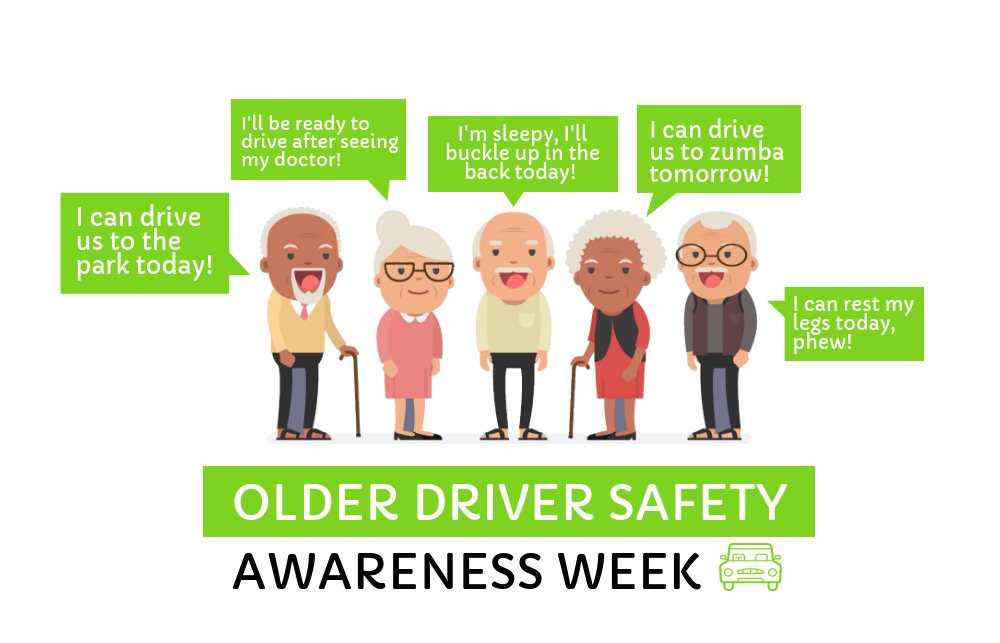Older Driver Safety Awareness Week provides a platform for raising awareness about an often-overlooked topic—the impact of aging on driving skills. With advancement in years as seniors hit the age 65 mark, changes in physical health, cognitive function, and sensory abilities can potentially affect their driving capabilities. These changes do not mean an aging senior driver is any less capable, but they require understanding, adjustments, and sometimes, tough decisions on whether to continue getting behind the wheel.
Why is it important for older adults to evaluate their behind-the-wheel skills? The National Highway Traffic Safety Administration (NHTSA) reports that nearly 20 percent of licensed drivers in the U.S. are 65 or older and the number is rising steadily. For Baby Boomers, driving a car represents independence and freedom. Many seniors say they feel more in control of their lives and experience a sense of satisfaction by maintaining the ability to drive.
Seniors Are Encouraged to Evaluate Driving Skills with Age
With age, we all notice our bodies changing. We may not be as quick on our feet or as sharp with our reflexes, compared to our youthful days. These changes also affect a senior’s ability to drive safely. Subtle changes in vision and hearing, slower reaction time, and cognitive changes can increase the risk of accidents. Therefore, timely evaluation of driving skills is necessary to ensure safety on the road for oneself and others.
How to Assess Your Senior Driving Skills
The goal is not to take away the keys but to ensure that seniors can drive safely. According to the NHTSA, “for every 1,000 people involved in crashes, senior drivers are involved in 96.61 accidents.”
Here are some steps for evaluating senior driving skills:
Professional Driving Assessment: A qualified occupational therapist or a certified driving rehabilitation specialist can provide an unbiased evaluation of your driving skills for a comprehensive outlook. Reach out to your local American Automobile Association (AAA) chapter to schedule a comprehensive driving skills evaluation.
Self-Assessment: Check for any difficulty in turning your head to look for oncoming traffic, maintaining speed, changing lanes, or being surprised by the presence of vehicles or pedestrians that seem to come out of nowhere. These could be signs indicating changes in your driving abilities.
Both AARP and AAA provide driving self-assessment safety checklists online with questions to ask either yourself as an older driver or a senior loved one who is driving. You can also check with your state Department of Motor Vehicles (DMV) to sign up for its Mature Driver Improvement Course designed for drivers aged 55 and older. The mature driver educational program offers both classroom and behind-the-wheel instruction that can help older drivers refresh their understanding of road safety and update their physical skills. Some insurance companies will offer a premium reduction for seniors who complete the course.
Another valuable resource for older adult drivers can be found at HealthinAging.org, where seniors can take an interactive driving safety questionnaire, read about safety tips for older drivers, evaluate whether their car is the best fit, and learn how to “age proof” their car.
Handouts, planning tools, and other older driver educational resources for seniors and their families, along with medical professionals, can be found at the Clearinghouse for Older Road User Safety (Chorus).
Medical Evaluation: Periodic health check-ups and discussion with your healthcare provider can help evaluate if any underlying health condition might be affecting your ability to drive safely. AAA points to the fact that two-thirds of senior drivers take five or more daily prescription medications that may affect their ability to drive safely. Senior drivers are encouraged to discuss their medications with their healthcare professional when starting or stopping a prescribed medication.
Tips for Seniors and Their Families on Deciding When to Hang Up the Keys
A senior’s decision to stop driving is usually tough, as it often symbolizes loss of independence. However, safety should always be a priority. Here are a few tips to help you with the decision:
Start the Conversation Early: The earlier you start discussing driving safety with family or loved ones, the easier it will be to take a decision when needed.
Explore Alternatives: Look for alternative transportation options in your area, which could be public transport, ride sharing, or even local community services that offer senior transport.
Stay Active: Maintain physical activity, like walking or yoga, to keep yourself healthy and independent.
Remember, Seniors: Giving up the keys doesn’t mean giving up your freedom or inhibiting your daily life. It is about ensuring your safety and those around you! As we observe Older Driver Safety Awareness Week with respect and love, let’s continue valuing our senior community’s wisdom, experience, and enriching contributions, while ensuring their safety.
Keep safe, keep driving!
“Evaluating Driving Skills as Seniors Age,” edited by Michelle Flores, Amada blog contributor.
















